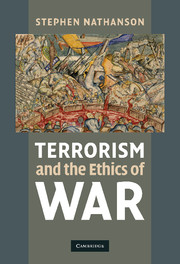Book contents
- Frontmatter
- Contents
- Acknowledgments
- Introduction
- PART I TERRORISM: WHAT'S IN A NAME?
- PART II WHY MORAL CONDEMNATIONS OF TERRORISM LACK CREDIBILITY
- PART III DEFENDING NONCOMBATANT IMMUNITY
- PART IV HOW MUCH IMMUNITY SHOULD NONCOMBATANTS HAVE?
- Introduction: the problem of collateral damage
- 17 The problem of collateral damage killings
- 18 The ethics of collateral damage killings
- Conclusion: terrorism and the ethics of war
- Bibliography
- Index
17 - The problem of collateral damage killings
Published online by Cambridge University Press: 05 June 2012
- Frontmatter
- Contents
- Acknowledgments
- Introduction
- PART I TERRORISM: WHAT'S IN A NAME?
- PART II WHY MORAL CONDEMNATIONS OF TERRORISM LACK CREDIBILITY
- PART III DEFENDING NONCOMBATANT IMMUNITY
- PART IV HOW MUCH IMMUNITY SHOULD NONCOMBATANTS HAVE?
- Introduction: the problem of collateral damage
- 17 The problem of collateral damage killings
- 18 The ethics of collateral damage killings
- Conclusion: terrorism and the ethics of war
- Bibliography
- Index
Summary
The problem of collateral damage killings and injuries reveals deep tensions in standard approaches to the ethics of war and commonsense morality. We can see the problem by considering the tensions between three commonly accepted beliefs.
1. Warfare is sometimes a morally permissible activity.
2. It is wrong to kill and injure civilians in war.
3. The killing and injuring of civilians in war is inevitable.
Steven Lee describes this set of statements as an “inconsistent trilemma,” by which he means that if any two of the statements are true, the third must be false. If harming civilians is both morally wrong and an inevitable result of war (as 2 and 3 say), then it cannot be true (as statement 1 asserts) that engaging in war is sometimes morally permissible. Alternatively, if war inevitably kills civilians but is nonetheless sometimes morally permissible (as 1 and 3 say), then statement 2, which says that killing civilians is never morally right, cannot be true. Once we accept that civilian deaths are inevitable in war, we are forced to conclude either that war is always wrong or that the killing of civilians is sometimes morally right.
DOUBLE EFFECT AND THE TRADITIONAL JUST WAR THEORY SOLUTION
Just war theory tries to solve this problem by interpreting the ban on killing civilians in the light of the principle of double effect, which stresses the moral importance of the distinction between intentionally causing harm and unintentionally doing so.
Information
- Type
- Chapter
- Information
- Terrorism and the Ethics of War , pp. 251 - 268Publisher: Cambridge University PressPrint publication year: 2010
